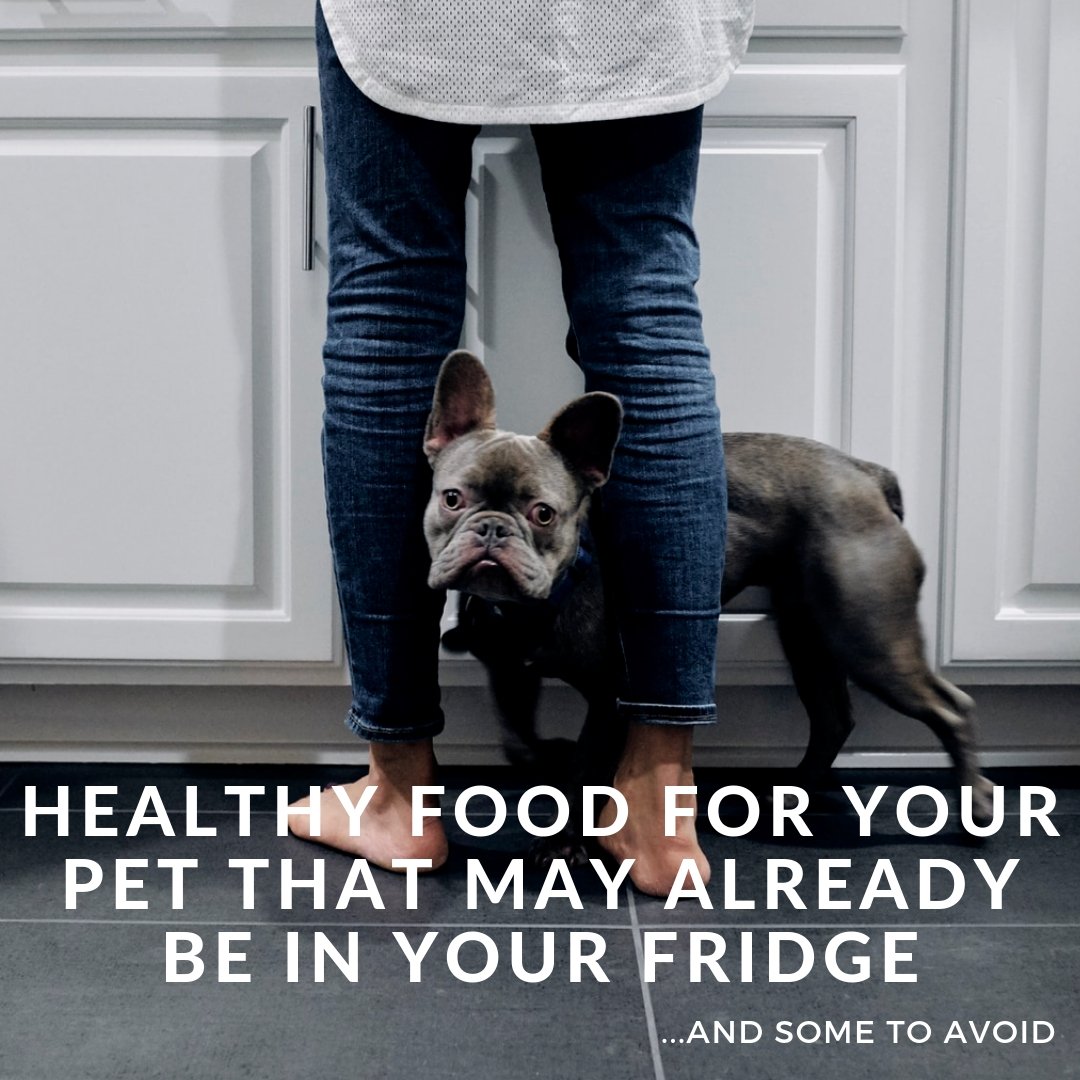
Healthy Foods For Your Pet That May Already Be In Your Fridge (& Some To Avoid)
Share
If your pup is anything like ours, they know the sound of a cheese wrapper (string cheese steals their heart). And, if we’re being totally honest, that’s not the only indulgence you sneak them from the fridge...right?! ;) But don’t worry, we’re not telling! In fact, we’re here to tell you to get your snack on with your pet! There are so many wonderful healthy treats that may already be in your fridge (and some not so healthy ones too!) Today, we’re going to go over some snack options for your pets that may be hiding in your kitchen (and some you should avoid!)
Safe and Healthy Foods:
- Carrots: These veggies are a perfect, low calorie, and crunchy snack! Carrots are chock-full of vitamins, minerals, and fiber. Just be mindful of giving your dog manageable pieces that they can safely eat without choking. You can even steam some up and feed them to your cat! Cats need fiber, which is why you may see her chewing on some household plants (pssst, some household plants are not safe for your pets to eat. Check out our blog post on pet-friendly & not so pet-friendly houseplants before you bring a new plant into your house). Try feeding her some baked or steamed carrots, squash, or broccoli to get that fiber fix.
- Natural, Sugar-Free Peanut Butter: What dog doesn’t love peanut butter? This entertaining snack is fun and will get your dog’s tail wagging! Although it's safe for dogs, be careful of portions. Peanut butter has a high-fat content and could lead to weight gain.
- Eggs: Eggs are a great source of protein and iron for both dogs and cats! Go ahead and scramble one up when you’re making breakfast but be mindful not to add any extra seasoning. Make sure raw eggs or raw egg whites are fed in moderation to your feline friend so you can not only avoid salmonella and E. coli risks but you can also prevent your cat from ingesting avidin, a protein cats are unable to absorb. As far as raw eggs for our canines, we give them (and the shells) to our girls, but we recommend asking your veterinarian first.
- Watermelon: Sounds weird, right? Your pup might be a little confused at first, but we foresee this being his favorite summertime snack every year! Make sure to only treat your dog to pieces that are seed-free and rind-free. We don’t feel guilty about it this snack either since it provides extra vitamin A, vitamin C, and H2O during the long hot summer days.
- Apples: Apples are another great Kong filling choice, but make sure to remove the seeds and core from this vitamin A and vitamin C packed treat. Apples are great because they help to clean residue off your dog’s teeth and will help to freshen his breath!
- Broccoli: This may be a tough sell, but some dogs do enjoy broccoli! Broccoli is high in fiber and vitamin C and is low in fat so it makes it a safe and nutritious treat for your dog. You can serve it raw or cooked, as long as no seasoning is added!
- Cheese: Who doesn’t love a little cheddar or mozzarella? But keep in mind, consumption should be very limited (much to the dismay of canines everywhere!). Many dogs have lactose intolerance, and if they overdo it, it may cause a tummy upset.
- Peas: Green peas are a great healthy treat and are actually commonly found as an ingredient in dog food!
- Yogurt or Kefir: Another dairy treat, unflavored yogurt or kefir is a great healthy treat that will give your dog some healthy probiotics. And what dog doesn’t love licking a spoon? Try freezing yogurt/kefir with some fruit to give him a nice refreshing treat! Since yogurt/kefir are dairy treats, remember to limit them for dogs with lactose intolerance!
- Salmon: Both dogs and cats only get a fraction of the omega-3 that they need. Fresh Salmon provides healthy fat, protein, and omegas that they need and is a delicious treat for both cats and dogs!
- Pumpkin: Pumpkins are a great superfood, and a perfect treat during the fall and winter! It’s packed full of nutrients and even helps keep their skin and coat strong and healthy.
- Avocados: This one’s for the cats (we knew they’d be the ones to order the avo-toast)! Avocado provides vitamins A, C, E, and B6 which is great for your cat’s skin and coat. While avocados are technically safe for dogs, in large quantities, it can cause upset tummies and diarrhea. Portions should be kept small for your cats too as avocados are higher in fat. And, of course, make sure the skin and pit are entirely removed before serving it to your pets.
Unsafe Foods:
- Chocolate: We’re sure you’re aware of this common unsafe food for your pet, but we have to mention it! Chocolate is toxic to both dogs and cats because of the chemical theobromine and could lead to death. Not only should you not serve chocolate to your pet, but you should also keep it stored in a place far from their reach (or...you could always just eat it right away 😉).
- Grapes: Most people don’t know this, but besides being a choking hazard, grapes are highly toxic to your pets. Consumption of even a small amount of grapes could lead to kidney failure and death.
- Macadamia Nuts: These nuts are intolerable and can make your pet miserable. While they are unlikely to lead to death, they will undoubtedly lead to significant health issues and make for an unhappy pup.
- Onions: Onions contain compounds that are harmful to dogs. If your dog gets into an onion, they may experience anemia, gastroenteritis, and/or damage to red blood cells.
- Cooked Bones: A lot of dog owners will hand over a bone once it’s been picked clean. However, you should know that cooked bones can easily splinter. When a bone splinters, it can cause these splinters to enter the dog's track and cause some nasty damage. Instead, we prefer giving raw bones! We also recommend talking with your vet about some chew toys or products that are safer for your pet, especially depending on his age, teeth condition, or chewing tendencies.
- Alcohol: Alcohol has the same effect on dogs as in people but in much smaller doses. For those of you with cats, it’s even more imperative that you don’t try to party with your feline friend. Even trace amounts of alcohol can lead to severe brain damage or liver failure.
- Xylitol: Xylitol is rather sneaky. You won’t find xylitol in your fridge, but you will find it in some processed foods. If you’re feeding your dog anything that has a label, be sure to look for this chemical. It is a sugar substitute and most commonly found in baked goods, gum, and candy. Even small amounts of consumption could lead to dangerous drops in blood pressure, kidney failure, and death.
Some foods in your fridge are healthy for your pets and can be a great way to bond during an afternoon snack time! However, other snacks can be downright harmful or toxic.
And before we end this post, it should be known that even though you now know some foods to avoid entirely, any new food for your pet should be introduced gradually. Food intolerances are common and you don’t want to overdo something without knowing its effect on your individual pet. If you think your pet has ingested something he shouldn't have, be sure to contact your vet immediately.
If you have a pet that is in need of some assistance when it comes to digestion, we highly recommend Daily Thrive! This organic hemp and turmeric oil calms the discomfort and aches associated with inflammation, digestive disorders, illness, offers a soothing effect and helps to enhance your companion's overall wellness!
Join in on the conversation! We’d love to hear what your pet’s favorite snack from the kitchen! Let us know on Instagram @homescapepets and follow along to learn more about how to care for your pets holistically!

2 comments
Hi Janice!
Thank you for asking and for your support. We understand and appreciate your concern. Your pets are our #1 priority.
TURMERIC – We source our raw turmeric from a USDA Certified Organic supplier, who cultivates the turmeric rhizomes from a farming region of India that follows organic growing processes for all of their crops. Approximately 80% of all turmeric produced in the world comes from India due to their ideal climate and rainfall. All other turmeric is grown in China, Indonesia, Haiti, Taiwan, and Jamaica. Our U.S. raw material supplier performs in-house testing for purity, heavy metals, pathogens, foreign matter, and adulterates. Their testing detects impurities in the part-per-billion (PPB) range.
Bottom line: All of our turmeric has been quality assurance tested to ensure that there are no adulterants that exceed the federal standards.
HEMP – Our hemp oil is USDA Certified Organic, grown right here in beautiful Colorado.
All of our products from beginning to end, are in compliance with current Good Manufacturing Practices (cGMP) to ensure compliance with all relevant USDA food safety regulations including sourcing, receiving, processing, packaging, and shipping. Each ingredient (except the green lipped mussel) is USDA Organic certified. However, our manufacturing facility has not yet completed the USDA Organic Certification Audit as they also produce and house other food products that are non-organic in the same facility. Because our products may come in contact with other non-organic products, we cannot legally or in good conscience, claim our products to be USDA Certified Organic.
As a small business, it is also very costly to obtain the audit and certification. However, we expect to be fully USDA Organic Certified within the next 12-24 months. Rest assured that our products are organic, safe, effective, and well-tolerated by dogs and cats alike.
Please let us know if you have any other questions. We are always happy to help pet owners make informed decisions about their pet’s well-being. Have a great day!
~ Homescape Pets
I recently read that turmeric is a dangerously high pesticide plant. Can you tell me where your turmeric and hemp are sourced for your calming relief? Thank you